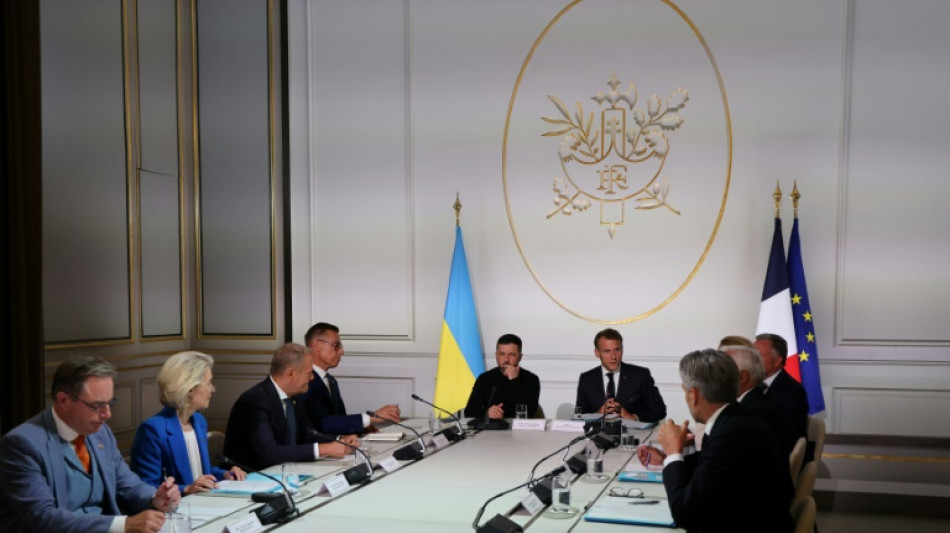
RYCEF
0.6300


More than two dozen countries have pledged to join a force to deploy in Ukraine after any eventual peace deal with Russia, aiming to deter Moscow from again attacking its neighbour, leaders announced Thursday.
A "reassurance force" for Ukraine is a key pillar of the security guarantees a coalition of mainly European countries want to offer to Ukraine if the war ends via a peace deal or a ceasefire.
However there is also growing concern that Russian President Vladimir Putin is now showing no interest in a peace accord, with alarm intensifying after his high-profile visit to Beijing this week.
And the extent of any US involvement in any eventual security backstop remains uncertain, even after European leaders spoke to President Donald Trump via video conference following the summit in Paris of the so-called "coalition of the willing".
It was hosted by French President Emmanuel Macron and attended by Ukraine's President Volodymyr Zelensky, while others, like UK premier Keir Starmer, participated remotely.
The meeting represented a new push led by Macron to show that Europe can act independently of Washington after Trump upended US foreign policy and launched direct talks with Putin after returning to the White House.
The United States was represented by Trump's special envoy Steve Witkoff, who also met with Zelensky separately.
- 'First concrete step' -
Europe has been under pressure to step up its response over three and a half years after Russia launched its full-scale invasion in February 2022.
"We have today 26 countries who have formally committed -- some others have not yet taken a position -- to deploy as a 'reassurance force' troops in Ukraine, or be present on the ground, in the sea, or in the air," Macron told reporters, standing alongside Zelensky.
Zelensky hailed the move. "I think that today, for the first time in a long time, this is the first such serious concrete step," he said.
The troops would not be deployed "on the front line" but aim to "prevent any new major aggression", the French president said.
Macron added that another major pillar was a "regeneration" of the Ukrainian army so that it can "not just resist a new attack but dissuade Russia from a new aggression".
Macron said the United States was being "very clear" about its willingness to participate in security guarantees for Ukraine.
However, the American contribution remains unclear.
There are also divisions within the coalition, with German Chancellor Friedrich Merz urging more pressure but remaining cautious about the scope of involvement.
"Germany will decide on military involvement at the appropriate time once the framework conditions have been clarified," a German government spokesman said after the summit.
Taking a similar line, Prime Minister Giorgia Meloni reiterated that Italy will not send troops to Ukraine, but it could help monitor any potential peace deal, her office said.
Before the Paris talks, Russian foreign ministry spokeswoman Maria Zakharova said Moscow would not agree to the deployment of foreign troops in Ukraine "in any format".
- 'Play for time' -
Frustration has been building in the West over what leaders say is Putin's unwillingness to strike a deal to end the conflict.
Zelensky said the call with Trump discussed sanctions on Russia and protecting Ukraine's airspace.
"We discussed different options, and the most important is using strong measures, particularly economic ones, to force an end to the war," Zelensky said on social media.
The White House said it urged European countries to stop purchasing Russian oil "that is funding the war".
A Russian rocket attack Thursday on northern Ukraine killed two people from the Danish Refugee Council who were clearing mines in an area previously occupied by Moscow's forces, the local Ukrainian governor said.
Macron warned that if Russia continued refusing a peace deal, then "additional sanctions" would be agreed in coordination with the United States.
He accused Russia of "doing nothing other than try to play for time" and intensifying attacks against civilians.
The gathering followed Putin's high-profile trips to China and the United States, where he met with Trump in Alaska last month.
Speaking Wednesday in Beijing, where he attended a massive military parade alongside Chinese President Xi Jinping, Putin hailed his forces' progress in Ukraine, adding that Russian troops were advancing on "all fronts".
fff-vl-cad-as-sjw/rlp/gv/dc
G.Tsang--ThChM